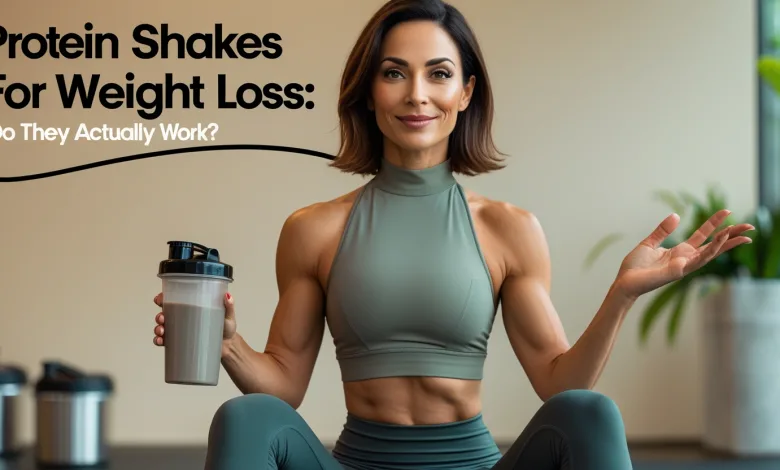Protein Shakes for Weight Loss: Do They Actually Work?

Protein shakes have become the go-to solution for quick weight loss, but do they actually deliver on their promises? This evidence-based guide cuts through the marketing hype to reveal when protein shakes can genuinely help your weight loss journey—and when they might just be emptying your wallet.
The Protein Shake Revolution: Marketing vs. Reality
Let’s face it—the fitness industry’s been absolutely obsessed with protein shakes for decades now. Walk into any gym, and you’ll spot at least a dozen people clutching their shaker bottles like they’re holding liquid gold. And hey, the marketing’s worked wonders! The global protein supplements market was valued at a whopping $20.47 billion in 2022 and is projected to reach $32.56 billion by 2030. That’s a whole lotta shakes!
But here’s the million-dollar question that’s probably brought you here today: Do protein shakes for weight loss actually work, or are we all just drinking the Kool-Aid (or should I say, protein-Aid)? Well, the answer isn’t as straightforward as those before-and-after ads would have you believe. It’s complicated—just like your relationship with that treadmill gathering dust in your basement.
The Science Behind Protein and Weight Management
Before we dive into whether these shakes are miracle workers or just overpriced milkshakes, let’s talk about why protein has earned its weight-loss superstar status in the first place.
Protein is kind of a big deal when it comes to weight management, and that’s not just gym-bro science talking. Our bodies actually burn more calories digesting protein compared to fats or carbs—a phenomenon called the thermic effect of food (TEF). Studies show that protein has a TEF of 20-30%, meaning up to 30% of protein’s calories are burned during digestion, compared to only 5-10% for carbs and fats. That’s basically like getting a metabolic freebie with every bite!
And that’s not all—protein is the ultimate hunger-buster. Research published in the American Journal of Clinical Nutrition found that increasing protein intake from 15% to 30% of calories helped participants eat 441 fewer calories per day and lose 11 pounds in 12 weeks, all without actively restricting anything. Why? Because protein increases satiety hormones like GLP-1, peptide YY, and cholecystokinin, while reducing the hunger hormone ghrelin. Talk about working smarter, not harder!
How Protein Shakes Can Support Weight Loss Goals
Now that we’ve established protein’s weight-loss cred, let’s see how those convenient shakes fit into the picture.
First off, convenience is king, and that’s where protein shakes truly shine. When life gets crazy (and when doesn’t it?), having a nutritionally balanced option that takes 30 seconds to prepare can be the difference between sticking to your goals and making a desperate dash through the drive-thru. A 2018 meta-analysis published in Nutrients found that meal replacements, including protein shakes, led to greater weight loss compared to traditional diets, particularly in the short term. The researchers attributed this largely to their simplicity—these shakes take the guesswork out of portion control and calorie counting.
Protein shakes also excel at preserving lean muscle mass during weight loss, which is crucial since muscle is your body’s calorie-burning powerhouse. When you create a calorie deficit (eating fewer calories than you burn), your body can sometimes get a little too eager and start breaking down muscle along with fat. A higher protein intake, like that provided by protein shakes, helps protect your muscles from this fate. A study in the International Journal of Obesity showed that participants who consumed more protein during weight loss maintained more muscle mass and experienced greater fat loss compared to those on a standard protein diet.
The Various Types of Protein Shakes: Which Work Best?
Not all protein shakes are created equal—there’s a whole spectrum of options out there, from ready-to-drink bottles to DIY concoctions. Let’s break ’em down:
Commercial Protein Powders
- Whey Protein: The popular kid on the block. It’s absorbed quickly, contains all essential amino acids, and has been shown to boost fat loss while preserving muscle. A systematic review in the Journal of the American College of Nutrition found that subjects supplementing with whey protein lost more body fat and showed better preservation of lean muscle compared to control groups.
- Casein Protein: Whey’s slower-digesting cousin. It forms a gel in your stomach, providing a steady release of amino acids. This makes it particularly effective for nighttime use, as it can help prevent muscle breakdown during sleep. Research in the British Journal of Nutrition showed that casein consumption before bed increased protein synthesis rates during overnight recovery.
- Plant-Based Proteins: Including pea, rice, hemp, and soy. These are fantastic for vegans or those with dairy allergies. While individual plant proteins might not have complete amino acid profiles, blends often solve this issue. A 2019 study in Sports found that plant protein supplementation was as effective as animal protein for supporting muscle strength and mass gains when protein intake was matched.
Meal Replacement Shakes
These are the all-in-one options that go beyond just protein, offering a balanced mix of macronutrients, vitamins, and minerals. They’re typically higher in calories than pure protein shakes but are designed to replace entire meals.
A comprehensive 2003 study published in the International Journal of Obesity found that partial meal replacement programs produced sustainable weight loss. Participants who replaced one or two meals daily with meal replacement shakes lost 7-8% of their body weight over a year, compared to 3-7% for those following traditional calorie-restricted diets.
DIY Protein Shakes
Don’t underestimate the power of homemade options! With a good blender and some nutritional know-how, you can create protein-packed shakes tailored to your preferences and goals. The advantage here is complete control over ingredients, which means no hidden sugars or artificial additives.
Common Pitfalls: When Protein Shakes Sabotage Your Weight Loss
Okay, so we’ve covered how protein shakes can be valuable allies in your weight loss journey. But let’s get real—they’re not magical potions, and there are several ways they can actually work against you.
The biggest blunder? Using protein shakes as additions rather than substitutions. If you’re downing shakes on top of your regular meals, you’re simply adding calories to your daily intake, which is—news flash!—counterproductive for weight loss. A standard commercial protein shake can pack anywhere from 150-300 calories. Treat that as a bonus snack every day, and you could be unknowingly consuming an extra 1,050-2,100 calories per week. That’s potentially half a pound of weight gain, not loss!
Another trap is falling for the “health halo” effect. Just because it says “protein” on the label doesn’t automatically make it healthy. Many commercial options are loaded with added sugars, artificial sweeteners, thickeners, and preservatives. I’ve seen “protein shakes” in the wild that have more sugar than a candy bar! Always check the ingredients list and nutrition facts—your waistline will thank you.
And then there’s perhaps the most insidious pitfall: developing an over-reliance on liquid nutrition. Protein shakes don’t teach you the healthy eating habits needed for long-term weight management. They’re a tool, not a lifestyle. Research published in the American Journal of Clinical Nutrition suggests that liquid calories don’t trigger the same satiety signals as solid foods, potentially leading to overconsumption later in the day.
Creating an Effective Protein Shake Strategy for Weight Loss
Alright, now that we’ve covered the good, the bad, and the frothy, let’s talk strategy. How can you incorporate protein shakes into your weight loss plan in a way that actually gets results?
First and foremost, use them strategically—not randomly. The most evidence-backed approach is to replace one meal (usually breakfast or lunch) with a protein shake. This creates a controlled calorie deficit while ensuring you’re still getting adequate nutrition. A 2020 review in Nutrition and Health found that this partial meal replacement strategy led to greater weight loss than conventional reduced-calorie diets, especially among people who struggled with portion control.
Timing matters too! Having your shake shortly after exercise can enhance muscle recovery and potentially boost the afterburn effect (excess post-exercise oxygen consumption, or EPOC), where your body continues burning calories at an elevated rate. Research in the Journal of the International Society of Sports Nutrition suggests that consuming protein within the “anabolic window” (30-60 minutes post-workout) maximizes muscle protein synthesis.
Here’s a simple framework to get started:
- Choose quality protein: Look for options with at least 20g of protein per serving and minimal added sugars (ideally less than 5g).
- Mind the calories: Your shake (including any add-ins) should typically be 300-400 calories if replacing a meal.
- Consider your overall diet: Make sure your remaining meals are nutrient-dense and balanced.
- Stay hydrated: Protein metabolism requires water, so increase your intake when using protein supplements.
- Monitor and adjust: Track your progress and tweak your approach based on results.
Beyond the Shake: Complementary Strategies for Optimal Results
Let’s be crystal clear—protein shakes aren’t a silver bullet. They work best as part of a comprehensive weight management approach. And honestly, if you’re chugging protein shakes while ignoring other aspects of a healthy lifestyle, you’re basically trying to bail out a leaky boat without patching the hole.
Regular physical activity is non-negotiable. Combining protein supplementation with resistance training gives you the best of both worlds: the training stimulates muscle growth, while the protein provides the building blocks. A 2020 study in the Journal of the International Society of Sports Nutrition found that participants engaging in resistance training while following a high-protein diet (including supplements) lost more fat and gained more muscle than those on a standard protein diet with the same exercise regimen.
Don’t neglect whole food nutrition either. While protein shakes can be convenient meal replacements, they shouldn’t replace your entire relationship with real food. Whole foods provide fiber, phytonutrients, and a complex matrix of nutrients that work synergistically in ways we’re still discovering. The Mediterranean diet, for instance, has consistently been associated with long-term weight management and reduced risk of chronic diseases, according to research published in The New England Journal of Medicine.
And perhaps most importantly, consider the sustainability of your approach. Can you see yourself incorporating protein shakes into your routine long-term? The best weight loss strategy is always the one you can stick with, and for many, that means finding a balance between convenience and enjoyment.
Frequently Asked Questions About Protein Shakes and Weight Loss
Can I live on protein shakes alone?
Short answer: No, and you really shouldn’t try. While meal replacement shakes are formulated to provide essential nutrients, they typically don’t contain all the phytonutrients, antioxidants, and fiber found in whole foods. A diet consisting solely of protein shakes would likely lead to nutrient deficiencies over time, not to mention it would be incredibly boring! The American Dietetic Association recommends that meal replacements be used to replace a maximum of two meals per day, with at least one meal consisting of regular food.
Will protein shakes make me bulky?
This is a common concern, especially among women, but the short answer is no—not unless that’s your specific goal and you’re training accordingly. Building significant muscle mass requires a calorie surplus (eating more than you burn), progressive resistance training, and typically male levels of testosterone. For most people using protein shakes as part of a weight loss plan, the increased protein will help preserve existing muscle mass while the overall calorie deficit promotes fat loss, resulting in a more toned, not bulky, appearance.
How much protein do I actually need?
The standard Recommended Dietary Allowance (RDA) for protein is 0.8 grams per kilogram of body weight, but this is actually the minimum to prevent deficiency, not the optimal amount for weight loss or athletic performance. For active individuals looking to lose weight while preserving muscle mass, research suggests 1.6-2.2 grams of protein per kilogram of body weight is more appropriate. For someone weighing 150 pounds (68 kg), that’s about 109-150 grams of protein daily.
Are protein shakes safe for everyone?
While protein shakes are generally safe for most healthy adults, certain populations should exercise caution. People with kidney disease may need to limit protein intake and should consult their healthcare provider before using protein supplements. Those with dairy allergies should avoid whey and casein proteins. Pregnant or breastfeeding women and individuals with certain medical conditions should also speak with a healthcare professional before adding protein supplements to their diet.
The Final Verdict: Protein Shakes as Part of Your Weight Loss Toolkit
After diving deep into the research and cutting through the marketing fluff, here’s the bottom line: Protein shakes can indeed support weight loss—but they’re not magic and they’re certainly not mandatory.
The science clearly shows that increased protein intake can enhance weight loss through improved satiety, preserved muscle mass, and a slightly elevated metabolic rate. Protein shakes offer a convenient, portion-controlled way to boost your protein intake, which is particularly valuable in our busy, on-the-go lives.
However, their effectiveness ultimately depends on the context in which they’re used. Are you replacing higher-calorie meals or simply adding shakes to your existing diet? Are you choosing quality products with minimal additives, or falling for cleverly marketed sugar bombs? Are you using them as a supplement to a balanced diet and active lifestyle, or as a perceived shortcut?
The most successful approach views protein shakes as one tool in your weight management toolbox—valuable in certain situations but not a complete solution. They work best when combined with regular physical activity, a predominantly whole-food diet, adequate hydration, and sustainable lifestyle habits.
So, do protein shakes for weight loss actually work? Yes, they can—but only if you’re using them correctly as part of a comprehensive, individualized approach to weight management. They’re not a magic bullet, but in the right hands (or shaker bottle), they can certainly help you hit your targets.






